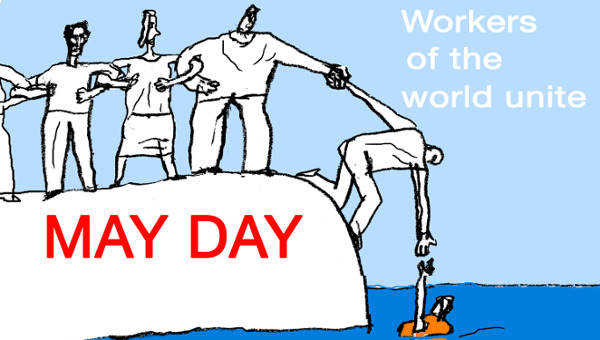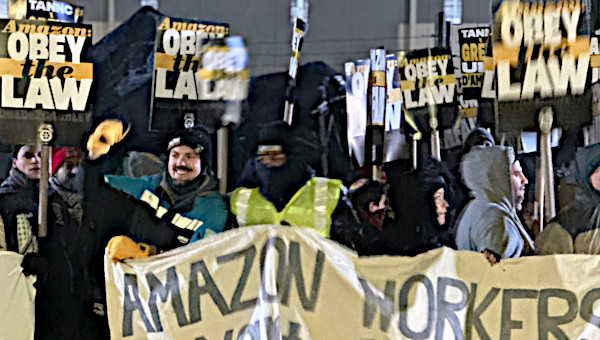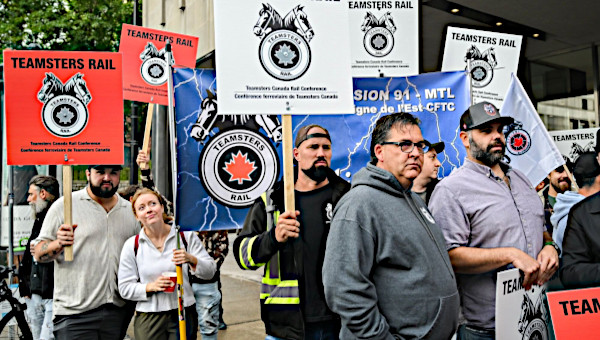On Saturday, 26 January 2013 tens of thousands of teachers and supporters rallied outside the Liberal leadership convention at Maple Leaf Gardens in Toronto in opposition to their Bill 115 which stripped Ontario teachers’ collective bargaining rights. Every corporate media outlet covered this story. By all accounts the rally was a huge, peaceful success.
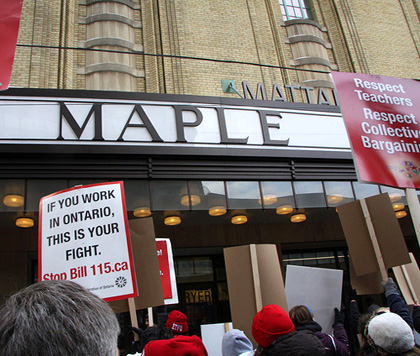
Although COPE’s Ontario Director was assaulted by Toronto Police, no media coverage was devoted to this story. Whereas entire forests have been destroyed for articles about the high profile attacks against workers’ rights to collectively bargain, no trees have been used explaining why the strike at Porter, and others, have happened with complete government indifference. What’s the difference between these two struggles? What is the significance of the strike at Porter? Most importantly, how can activists participate in these struggles to develop new capacities of resistance to the neoliberal assault on workers’ rights?
A Movement Under Attack
Increasingly, governments are enacting legislation to suppress workers’ rights when those rights challenge corporate power. Teachers, Postal Workers, Air Canada and CP Rail workers have all had their right to collectively bargain and/or strike recently curtailed by both Federal and Provincial governments. These very public attacks have served as rallying cries against these draconian acts, culminating in the rally outside Maple Leaf Gardens.
Unfortunately these worthwhile public battles have taken attention away from the second neoliberal response to workers’ collective rights. In situations where the strike is likely to ultimately fail (or the lockout likely to succeed), governments often refuse to take any action at all. From Caterpillar in London to Vale Inco in Sudbury to Rio Tinto in Alma, Quebec, governments stayed mostly inactive against extremely aggressive corporate tactics. This combination of suppression and silence sends a message loud and clear to our class: “if you are strong we will suppress you and if you go on ‘strike’ (most are lockouts) you will suffer.”
Clearly different strategies are required to counter this strategy of worker suppression from above and the culture of appeasement and defeatism endemic in much of the labour movement. Prior to the postwar social contract which institutionalized unions in exchange for a place at the table, our movement was much more reliant on the community for its success. Many of these capacities have been lost due to years of institutionalized bargaining for specific workplace demands with the community often called upon to ‘support’ the strikers or being inconvenienced by their actions.
At the same time community groups increasingly mobilized around non-workplace issues of local concern. Union responses to these issues have been at times: opposed (e.g. the casino debate in Toronto), disinterested (e.g. animal rights) or in support as long as that support doesn’t create a political backlash against its institution (e.g. anti-poverty groups).
The Return of Small Labour
Small labour could be defined as returning to our community based roots. It starts from the realization that we currently don’t have the capacity to wage the big, protracted campaigns needed to turn impressive mobilizations, like that seen at the provincial Liberal convention, into a sustained movement. For labour activists it also means that instead of endlessly challenging the priorities of some senior union leaders who say one thing but fund another, we put our limited capacities into smaller struggles where our contributions will have the most benefit.
An advantage of mobilizing for these smaller struggles is that due to their low profile or likelihood of defeat, they are often free of political interference from either the government or the worst elements of the union bureaucracy. Importantly, their success hinges on the ability to educate and mobilize different sections of the community to attain the numbers and pressure needed to win. For activists, this develops the important skills and capacities needed to build solidarity between formerly isolated groups. Away from the spotlight, this organic approach to labour activism has helped contribute to some impressive wins.
Ming Pao
At Occupy Toronto, the Greater Toronto Workers’ Assembly (GTWA) and many activists involved in the Occupy movement essentially adopted a strike for a first contract by 135 workers at the Ming Pao Chinese language daily paper as their own. During the occupation of St. James’ Park, an Educational Assembly was held in the park where the workers finally had the audience needed to explain their struggle.
This was a crucial event as the working-class struggles within the Chinese-Canadian community are often mischaracterized or neglected within broader Canadian society. It was also critical because it gave the workers a real sense that they mattered within the community and how all working-class struggles were connected. Subsequent community Flying Squad actions on the picket line cemented these bonds of solidarity and gave the workers the confidence required to sustain their strike for the 11 weeks needed to get an OLRB imposed first contract with significant gains.
York University – CUPE 3903
In 2009, Ontario’s government forced back to work the striking education workers represented by CUPE 3903 after a bruising and divisive 85 day strike. This attack was successful against the Local’s divided membership.
As the talks for a new contract began in 2012, the University’s administration believed they were bargaining against a group of workers with very little community support. On the day of the strike deadline a community Flying Squad (Solidarity YYZ) made up of parents who work for the Region of Peel and Toronto Airport did a brief occupation of the University President’s office to deliver the message that their impression of lack of community support was wrong. This was an action that York was completely unprepared for as the support of suburban parents is a key part of the University’s long term success. With that support in doubt, an agreement was reached later that night.
The key to both of these community mobilizations depended on finding the links between groups with no previous connections. At Ming Pao, it was the most marginalized workers connecting with activists who were fighting against inequality. And at York it was parents who were facing their own labour issues mobilizing in support of their children’s university workers.
Porter Airlines
On 17 January 2013, 22 ‘fuelers’ at Porter Airlines went on strike for a first Collective Agreement. In an airline industry infamous for implementing a race to the bottom, these are the lowest paid. No one could accept Porter’s offer of 25 cents for those making $12 an hour and no raise for those making $14. Another key demand is for management to address their serious Health and Safety concerns.
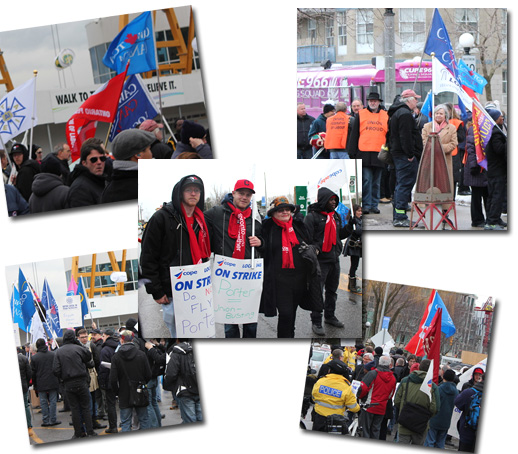
With the union movement’s energy focused on the Teachers’ struggle, it was the smaller solidarity Flying Squads that first mobilized support. As with Ming Pao and York, small groups can make a big impact when mobilizing for these smaller struggles.
IWW activists in particular are almost daily on the lines with the workers and engaging in joint actions. This is no easy task as Porter, the Toronto Port Authority (TPA) and their private security officers have engaged in an extremely aggressive campaign against these workers. This show of true solidarity has had a profound effect in maintaining worker morale and numbers.
Making the Connections
The Porter strike is a critical strike on so many levels. It is the first airline strike without open government interference for more than a decade. The only way to end the race to the bottom in the sector is by raising the floor. Porter’s serious Health and Safety problems, which have intensified since the strike, impact not only the workers but also the travelling public and the neighbouring community. The TPA is pretending it isn’t a public agency and is asserting extreme property rights including banning all picketing and information leafleting on ‘their property.’ This assertion not only takes away all Canadian’s Charter Right to peacefully engage in information campaigns at Canadian Airports, it is trying to assert private property rights on public land.
The TPA and Porter are important bases for Toronto’s Conservative elites. Prior to becoming an MP, Lisa Raitt was the TPA’s CEO. As with the TPA, Porter’s Board is also stacked with well connected Conservatives including Pamela Wallin. These elites have used the TPA to consistently override the democratic wishes of the people of Toronto even when they elected David Miller as Mayor who campaigned against the power of this undemocratic public agency.
Not satisfied with trying to assert private property rights, the TPA is now pushing for its own privatized and armed police force. This is an extremely dangerous precedent of allowing an agency with no regard for community or workers’ rights to assert the law with their own armed paramilitaries. Ottawa is using the TPA as its hammer against the striking workers. Their aggressive actions are designed to block effective picket lines and any economic impact on Porter. Porter’s arrogance is evidenced by their decision to take Transport Canada to Federal Court to prevent them from releasing a safety inspection report.
Mobilizing to Win
Making a list of what’s at stake is a critical exercise in mobilizing community solidarity. As with Ming Pao and York, once the issues are clearly identified, it is easy to see how all struggles are connected. It is no coincidence that the first solidarity groups that mobilized support for the Porter strike included those workers on the front lines of the ‘austerity agenda’ in the Public Sector and airline industry.
At the same time conversations (including a community video) started with other groups dealing for years with their own issues with the Port Authority. These discussions turned to action when community groups and workers hosted a joint BBQ-action on 10 February. Entirely new connections were also made when COPE Local 343 declared that the ‘BBQ’ would be an entirely vegan affair with all food supplied by a local animal rights, pro-worker, activist group called Toronto Pig Save.
This solidarity continues to deepen as the Greater Toronto Workers’ Assembly (GTWA) hosted a Community Town Hall on March 1st with presentations from the union and workers, community groups and the academic community discussing the commonality of their struggles.
The actions on the lines and in the community are raising the profile of this small strike. The Ontario Federation of Labour (OFL) mobilized in support of these workers starting with a rally on the February 28th.
Although no one can predict the strike’s outcome, the support needed to win continues to grow for this important fight. This is the type of community based solidarity that must be developed in all our working-class struggles. Sometimes it is the smallest struggles that matter the most. It just takes the right spark to get them started. •


